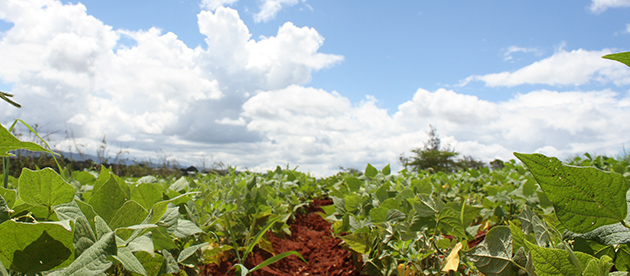Adapting agriculture to the adverse effects of climate change is vital, none more so for smallholder farmers who tend to suffer the brunt of varying temperatures and rainfall patterns.
PABRA bean breeder, Clare Mukankusi, reports on how a participatory action research project could help farmers adapt to the immediate effects of climate variability. This story was originally published in the Climate change, agriculture and food security (CCAFS) SmartAg Partner quarterly newsletter and also appeared on the CCAFS blog.
Researchers are working on implementing a participatory action research project linked to more resilient bean varieties in Uganda. Seeing as the country is a net exporter of beans, this project might help farmers get better armed to adapt to the immediate effects of climate variability.
Farmers in Uganda are willing to adopt and adapt new technologies in the face of varying climate scenarios. This is one of the conclusions drawn from on-going research in Uganda which is a net exporter of dry beans. Researchers from the National Agricultural Crop Research Resources Institute (NaCRRI) bean program and the international Centre for Tropical Agriculture (CIAT) under the Pan Africa Bean Research Alliance (PABRA) alliance are implementing a participatory action research (PAR) project aimed at strengthening the capacity of farming communities in Uganda to adapt to the immediate effects of climate change and climate variability.
This research is being implemented in Hoima and Rakai, the CGIAR Research Program on Climate Change, Agriculture and Food Security (CCAFS) learning sites in Uganda. Hoima and Rakai are characterised by significant weather variability, highly degraded landscapes, decreasing soil fertility and increasing soil erosion that is already impacting negatively on crop and livestock production. Hoima is showing trends of becoming wetter and Rakai drier as a result of climate change. Common bean (Phaseolus vulgaris L), which is widely grown in Uganda as a major food and cash crop, is sensitive to climate change and variability, and therefore serves as a good entry point to evaluate adaptability to climate change and variability amongst the crops grown by the rural households.
Involving farmers in research is a key component to adaptation
The research design was motivated by the understanding that social learning between researchers and farmers is central to modifying attitudes, actions and processes needed to adapt to climate change. Both farmers and researchers have knowledge and technologies that can be adapted, integrated and promoted to address climate change and variability.
The project was initiated in March, 2012 with nine farmer groups comprising of both men and women members from theCCAFS benchmark sites in Uganda. In the first phase, field trials to evaluate performance of four farmer-acceptable drought tolerant bean varieties from the Kenya Agricultural Research Institute (KARI), one released variety (NABE 15) and one farmer variety, were set up. Participatory variety selection sessions were organized and over 300 farmers engaged in discussions to identify their preferred traits and respective trade-offs.
———————————————-
Read the full story on the CCAFS blog.

